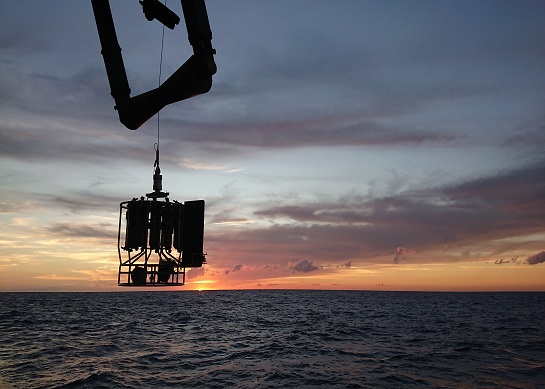
Photo credit: Pete Brown, NOC.
The University of Liverpool is leading a new collaborative research project to explore how the Gulf Stream affects the climate system through the transport of nutrients and carbon.
Funded by the Natural Environment Research Council (NERC) and the US National Science Foundation (NSF), the £3.7 million project will use sensors located in the fast-flowing waters moving through Florida Straits and autonomous vehicles roaming the upper 2000m of the Atlantic basin to measure nutrient and carbon levels, and the amount of turbulence in the Gulf Stream.
This data will be used alongside the latest state-of-the-art ocean and climate models to find out more about how the Gulf Stream current affects the transport of nutrients and carbon and if it enhances or inhibits the uptake of carbon dioxide by the ocean.
Originating at the tip of Florida, the Gulf Stream is generally viewed to lead to milder winters in Europe through its role in transporting heat over the Atlantic basin. However, less is known about the role it plays in the strength and pattern of carbon uptake over the North Atlantic.
Professor Ric Williams, Chair in Ocean and Climate Sciences at the University of Liverpool and co-lead of the University of Liverpool’s Climate Futures research theme, will lead the programme.
He said: “We know that the Gulf Stream is important for supplying heat to higher latitudes, leading to a warmer European climate. However, we need to better understand the role of the Gulf Stream on the carbon cycle given that the ocean takes up nearly 25% of the extra carbon emitted to the atmosphere.
The prevailing view of how the ocean affects the uptake of carbon dioxide is often outdated and generally ignores the three-dimensional aspect of the ocean circulation. In contrast, we aim to test the viewpoint that the Gulf Stream helps determine the strength and pattern of carbon uptake over the North Atlantic.
“The natural carbon sinks in the ocean and land are thought to be becoming less effective in taking up carbon dioxide from the atmosphere, a key finding of the 2021 Intergovernmental Panel for Climate Change (IPCC) report. This ocean and land carbon uptake then ultimately affects how much carbon dioxide remains in the atmosphere and so affects how much our climate system continues to warm, including determining whether there is continued warming when we reach net zero.”
The four year programme supports a team of experienced and early career researchers from the University of Liverpool, the National Oceanography Centre (NOC), the University of Southampton, the British Antarctic Survey, the Scottish Association for Marine Science and the University of Miami augmented by project partners at Massachusetts Institute of Technology, University of Rhode Island and Woods Hole Oceanographic Institution in the USA, and from research institutes in Bergen in Norway, Brest in France and Texel in the Netherlands.